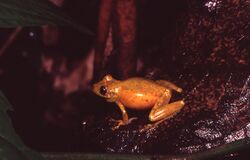Biology:Scinax cruentomma
| Scinax cruentomma | |
|---|---|

| |
| Scientific classification | |
| Domain: | Eukaryota |
| Kingdom: | Animalia |
| Phylum: | Chordata |
| Class: | Amphibia |
| Order: | Anura |
| Family: | Hylidae |
| Genus: | Scinax |
| Species: | S. cruentomma
|
| Binomial name | |
| Scinax cruentomma | |
| Synonyms[3] | |
| |
Scinax cruentomma is a species of frog in the family Hylidae. It is found in the upper Amazon Basin of southern Colombia, eastern Ecuador, northeastern and east-central Peru, and western Brazil; its presence is French Guiana is dispted.[1][3] The specific name cruentomma is derived from the Greek cruentos meaning "bloody" and omma meaning "eye", referring to the red streak in the eye of this frog.[2] This species is also known as the Manaus snouted treefrog.[1][3]
Description
Adult males measure 25–28 mm (1.0–1.1 in) and adult females 26–31 mm (1.0–1.2 in) in snout–vent length. The snout is rounded. The tympanum is distinct.[2][4] The fingers lack webbing whereas the toes are half-webbed.[2] Skin is smooth to finely shagreened. The dorsum has creamy tan to uniform dark brown coloration, usually with brown markings. These that typically consist of canthal stripe, supratympanic stripe, and irregular (often longitudinal) marks on body. About half of the individuals have transverse bars on the limbs. The flanks are pale with or without small dark spots. The iris is silvery bronze and has a median horizontal red streak.[4]
A Gosner stage 30 tadpole has body length of 8.8 mm (0.3 in) and total length of 28 mm (1.1 in).[2]
The male advertisement call is a single, moderately long, poorly modulated, fast-pulsed note.[2]
Habitat and conservation
Scinax cruentomma occurs near temporary waterbodies in lowland tropical rainforest or rainforest edges,[1] but reaching altitudes as high as 1,200 m (3,900 ft) in major river valleys.[4] It has also been found in secondary forest and banana grove habitats. Breeding takes place in ponds both in clearings and in the forest. It is an abundant and adaptable species that is not facing significant threats.[1]
References
- ↑ 1.0 1.1 1.2 1.3 1.4 Ariadne Angulo; Claudia Azevedo-Ramos; Luis A. Coloma; Santiago Ron (2004). "Scinax cruentommus". IUCN Red List of Threatened Species 2004: e.T55948A11400080. https://www.iucnredlist.org/species/55948/11400080. Retrieved 13 February 2022.
- ↑ 2.0 2.1 2.2 2.3 2.4 2.5 Duellman, William E. (1972). "A new species of Hyla from Amazonian Ecuador". Copeia 1972 (2): 265–271. doi:10.2307/1442487.
- ↑ 3.0 3.1 3.2 Frost, Darrel R. (2022). "Scinax cruentomma (Duellman, 1972)". Amphibian Species of the World: An Online Reference. Version 6.1. American Museum of Natural History. doi:10.5531/db.vz.0001. https://amphibiansoftheworld.amnh.org/Amphibia/Anura/Hylidae/Scinaxinae/Scinax/Scinax-cruentomma.
- ↑ 4.0 4.1 4.2 Duellman, William E.; Wiens, John J. (1993). "Hylid frogs of the genus Scinax Wagler, 1830, in Amazonian Ecuador and Peru". Occasional Papers of the Museum of Natural History, University of Kansas 153: 1–57. https://www.biodiversitylibrary.org/part/2945.
Wikidata ☰ Q277756 entry
 |


